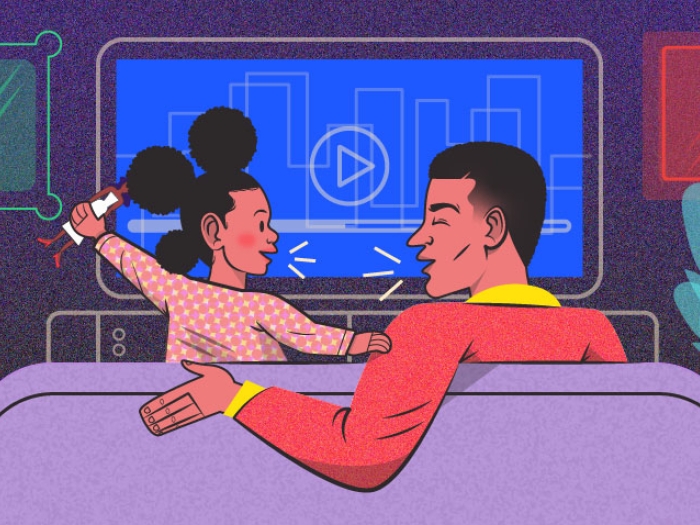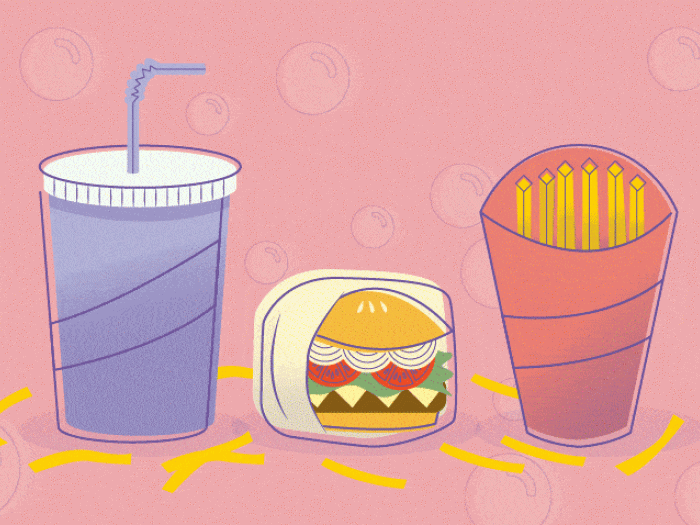With their young daughter unable to eat on her own, a family finds assistance — and, in time, sustenance — with the help of a special Michigan Medicine program.
1:00 PM
Author |

Gathering around the dinner table is an ordinary, sometimes hectic daily routine that some parents with small children might take for granted.
But for the Lick family, whose daughter overcame a feeding disorder that once prevented her from ingesting solid food, each shared meal is a blessing.
MORE FROM MICHIGAN: Sign up for our weekly newsletter
"There was a time when she hadn't eaten anything by mouth in three months," says Steven Lick, whose only child, Victoria, has since taken to gobbling pasta, animal crackers and her mother's homemade split-pea soup with delight. "Now she eats like a champ."
Shortly after Victoria's birth, doctors found four obstructions that led them to remove 19 centimeters of intestines after diagnosing her with short bowel syndrome. The infant spent the next 18 months receiving intravenous nutrition as her body healed.
As a result, she never learned the proper mouth mechanics to not only take liquids via breast or bottle, but also advance to other foods as she grew older.
When circumstances finally allowed, it took hours to get Victoria to drink even a few ounces of formula. Distractions such as verbal encouragement and YouTube videos offered no help.
It left Victoria's parents worried about her health and future.
After the family moved to the Detroit suburb of Beverly Hills, Michigan, they were referred to the Feeding Disorders Program at University of Michigan C.S. Mott Children's Hospital. Their initial consultation at U-M offered the first step in helping Victoria master new and necessary skills. It is one of just a few centers in the United States focused on kids with this special need.
And the needs are many: Babies accustomed only to IV feedings "don't have the same typical satiety and hunger cues," says Amy Drayton, Ph.D., pediatric psychologist and director of the Feeding Disorders Program. "They're much less likely to learn to chew and swallow in a natural way.
"You have to teach them, step by step."
It can't be understated how much a family's life revolves around food when it's a problem.Amy Drayton, Ph.D.
A complex problem
Children with feeding disorders aren't the same as so-called picky eaters.
Without practice with the tastes, textures and motions of eating — usually because of medical conditions — kids may choke, gag or vomit when any food or liquid is put in their mouths.
SEE ALSO: How a Pediatrician Helps Her Family Eat Healthfully at Home
That added stress may lead them to associate mealtime with anxiety or to throw tantrums, exacerbating the problem. The resulting malnutrition could cause weight loss and developmental delays.
In Victoria's case, she was underweight and nonverbal. She couldn't move her tongue or swallow.
Before moving to Michigan, the Licks, who were living in Chicago, were directed toward occupational and physical therapy.
They were never advised to address a feeding disorder.
"If we had been working on tongue placement and other things at the beginning, we probably could have mitigated a lot of this from the get-go," Steven says. "We had no idea there was specialty care available for kids like Victoria."

Mealtime mechanics
A collaborative approach at Michigan Medicine helped the Lick family attack the issue from all angles. Their care team included a pediatric psychologist and a pediatric surgeon who specializes in caring for kids with short bowel syndrome, in addition to a nurse, a pharmacist, a therapist, a nutritionist and a social worker.
"When we started caring for Victoria, she was fighting not to get the food in; she didn't know what to do with it," Drayton says. "Her parents were desperate."
In weekly sessions over six months, Victoria learned to get comfortable with the functions of her tongue, teeth, throat and jaw. Drayton's team used special tools, including a brushlike "Nuk" placed in Victoria's mouth, to provide stimulation and introduce the notion of texture.
Over time, as she grew more comfortable eating purees from a spoon, soft lumps of food were added to the mix. Tiny bites became larger ones. After that, crumbs were placed on the Nuk to stimulate brain connections and serve as a bridge to introducing more-solid edibles.
"We can teach them to move their tongue and keep it moving," Drayton says. "These kids haven't had to manipulate food to the side, to chew it and break it up."
The Licks made working with their daughter at home a daily mission between appointments.
Victoria graduated from feeding therapy in January 2016; she'll return for annual checkups to monitor her progress.
Beyond receiving comprehensive care at Mott, the Licks also sought speech therapy services through their local school district.
Catering to others
The Licks know they were lucky to get an appointment at U-M, and they realize other families might face a lengthy wait because the Feeding Disorders Program is in high demand.
Which is why Steven and his wife, Liz, recently worked with U-M to launch an online crowdfunding campaign with a fundraising goal of $75,000. That's enough, they say, to pay for a doctor's services to help train nurses to better spot the warning signs of a feeding disorder — and even jump-start therapies while families wait for an open spot in the program.
SEE ALSO: Diagnosing Fructose Intolerance: Morgan's Story
"We're trying to help smooth out that bottleneck," says Steven, noting that he hopes more early intervention can avoid the need for program admission in some cases.
Meanwhile, the family wants to spread the word to other parents in similar predicaments. Steven's advice: Don't let a feeding disorder — or the suspicion of one — go unaddressed.
Drayton, who acknowledges the shortage of available experts, agrees: "There is a significant risk to waiting." Children who receive feeding therapy before they are a year old are likely to make quick progress within a few months, she says.
With Victoria set to celebrate her fourth birthday in April (she'll probably opt for pizza instead of cake, Steven says), her routine and relationship with food mirrors that of most kids her age.
This progress is both rewarding and heart-rending, not only for the Licks, but also for the care team members who helped Victoria master a vital life skill.
"It can't be understated how much a family's life revolves around food when it's a problem," Drayton says. "It's emotional for us when they can start to relax and enjoy each other around the table without that stress."

Explore a variety of health care news & stories by visiting the Health Lab home page for more articles.

Department of Communication at Michigan Medicine
Want top health & research news weekly? Sign up for Health Lab’s newsletters today!





